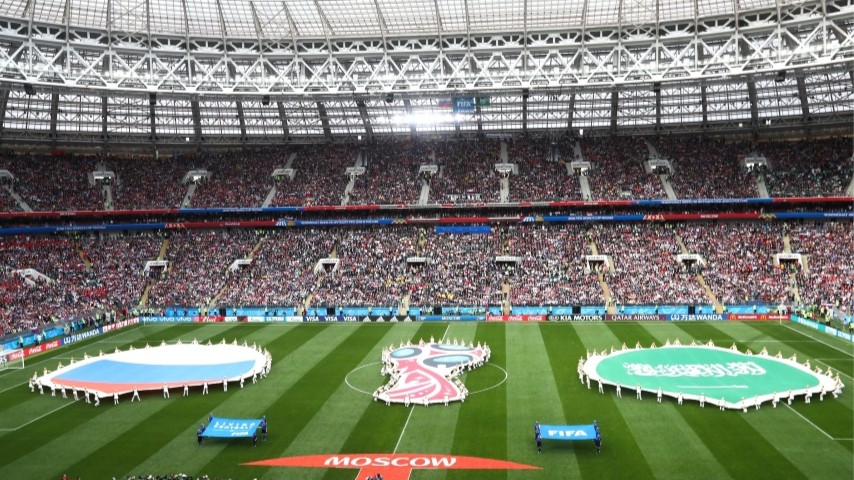The Ugliness Behind the Beautiful Game
Photo by Kremlin.ru, CC BY 4.0
Much of the summer, during that innocent year of 2002, I spent in a small pub near my home in the Irish countryside. I was seven years old, and Ireland, little footballing nation that it is, was competing at the World Cup in Japan and South Korea. It is a giddy occasion, a World Cup, especially for the smaller countries that bear no guarantees of qualifying for it, and I remember my happy wanderings about that pub, hobbit-height and hyperactive on too much sugar, staring up at drunken, smoking adults on towering bar stools, each one to a person screaming at chunky television sets mounted to the wall and spilling the heads of creamy pints onto the floor. A healthy, patriotic pride was on the air, amid the stench of cigarettes and stout-farts, as the Irish team acquitted themselves well and pushed Spain to a penalty shootout. These were days of ease and pre-recessionary stability, the country and world in rude health.
That’s the memory, recalled more than 20 years after the fact. The reality was, of course, less rosy. I was a child too young to understand it, but the world, both sporting and political, had already begun to shift in ominous directions. The abstraction we in the West reverently call the “rules-based order” had already begun to unspool by the summer of 2002, with the United States and its obsequious allies, only months earlier, launching its war on terror in response to 9/11. Afghanistan had been invaded, and the invasion of Iraq was a glint in George W. Bush’s eye, fated to begin the following year. The good ol’ days I recall from childish memories, in reality, weren’t quite so good.
But the football, the beautiful game, was surely in a healthy way. It bore character still, hadn’t yet become the shiny, generic product we stream via Amazon today, had not yet been taken over by despotic oil states and predatory capitalists, its governing institutions not yet hollowed out by naked corruption. Except, that’s not true, either. FIFA, soccer’s international governing body, was led at the time by Sepp Blatter, a man later banned from the organization on the grounds of profound corruption and financial mismanagement. The sport may not have been quite as morally bankrupt as it is today, but it was well on the way by then.
What has changed since 2002 is the degree to which soccer and geopolitics have become entangled. While the sport was corrupt all those years ago, it still represented an escape from the grubby business of reality, a 90-minute respite from the bleakness of world affairs. Those days are gone. The very aesthetics of the sport have been corporatized into a state of total homogeneity, in which stadiums act as arenas of late-capitalist blandness, where electronic pitch-side advertising hoardings scream at us to visit the oil states that increasingly own the sport. Quirks of local place and history have been expelled from stadiums, and, watching a match today, it is impossible not to be reminded of the ethical disintegration of our time. The sport reflects our political reality back to us.
At the head of it all today sits Gianni Infantino, the president of FIFA and the human embodiment of the sport’s moral vacuity. A woke-masquerading Bond supervillain, Infantino is shameless to the point of sociopathy, a man who either revels in gaslighting the world or is genuinely unable to tell he is doing it. It was Infantino, soccer’s supreme leader, who took it upon himself last week to host the “Extraordinary FIFA Congress,” a virtual event in which delegates representing each national football association of FIFA video-called in to “vote” for the countries that will host the 2030 and 2034 World Cups respectively. It was democracy in action, an opportunity for FIFA’s global membership to have its say in the direction the sport will take over the next decade.
-

-

-

-

-

-

-

-

-

-

-

-

-

-

-

-

-

-

-

-

-

-

-

-

-

-

-

-

-

-

-

-

-

-

-

-

-

-

-

-

-

-

-

-

-

-

-

-

-

-

-

-

-

-

-

-

-

-

-

-

-

-

-

-

-

-

-

-

-

-

-

-

-

-

-

-

-

-

-

-

-

-

-

-

-

-

-

-

-

-

-

-

-

-

-

-

-

-

-

-

-

-

-

-

-

-

-

-












































































































